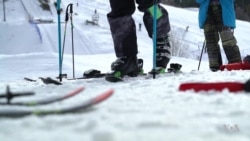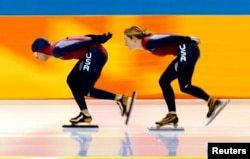Sixteen years after Utah hosted the 2002 Winter Games, the Olympic legacy is alive and well in Salt Lake City.
Eighty percent of the American team now in South Korea for the Winter Games trained in Olympic Park, which is also a community recreational resource for all Utah residents.
“It’s one of our main tenants here, at the Utah Olympic Legacy Foundation," says Kole Nordmann of the Utah Olympic Legacy Foundation, "to provide training opportunity for kids and people of all ages.”
About one-third of the American athletes on the U.S. national team in South Korea are from Utah. Hopeful parents of future Olympians are pleased to have the Park City sports center — hosted one-third of all medal events of the 2002 Games — in their backyard.
“They do a wonderful job of keeping the facilities active, usable," says Matthew Sapenen, a Park City resident. "They are all profitable. They employ a lot of people and it’s a great center for our kids to learn the winter sports disciplines.”
“Definitely more people have started skiing here," says Park City resident Kristin Berry. "And the locals have a lot more of an opportunity to take advantage of the resources. And the coaching is just mind-blowing. My son has a couple of Olympic athletes who are his coaches that he works with regularly, and there is such a huge influence on him.”
A new Olympic museum is also located here and includes a wall showcasing the medals from the 2002 Olympics.
“I get to walk through here every day and check up on these exhibits and kind of relive that excitement from the 2002 Games," says Jonathan Green of the Olympic Park Museum. "We have a lot of interactive video screens with clips from those Games, so it’s a great way to keep that spirit alive."
Utah's Olympic Oval has been called the ‘Fastest Ice on Earth’ after nine world records in speed skating were set there during the 2002 Games. Speed skater Derek Parra, a world record holder who took gold in the 1,500-meter, now heads the "Oval", also overseeing figure skating, curling and hockey.
“I think the perfect word is legacy," he says. "There are many venues now in countries where the Olympics were held, where buildings like this were rebuilt or are empty. And there isn't the same kind of spirit or excitement."
Surveys show a huge majority of Utah’s residents are in favor of welcoming the Olympics back to Salt Lake City, and its neighbor, Park City, according to a November poll. An Exploratory Committee has already been formed to consider a potential bid that would likely include the 2030 Winter Games.
“With all of the changes over 17 years we have to really take an inventory of everything we have here and see exactly what we need to add to make it as modern as possible," says Nordmann of the Olympic Legacy Foundation. "But the beautiful thing is that since we’ve kept this up for 17 years, we don’t have to build new facilities.”






